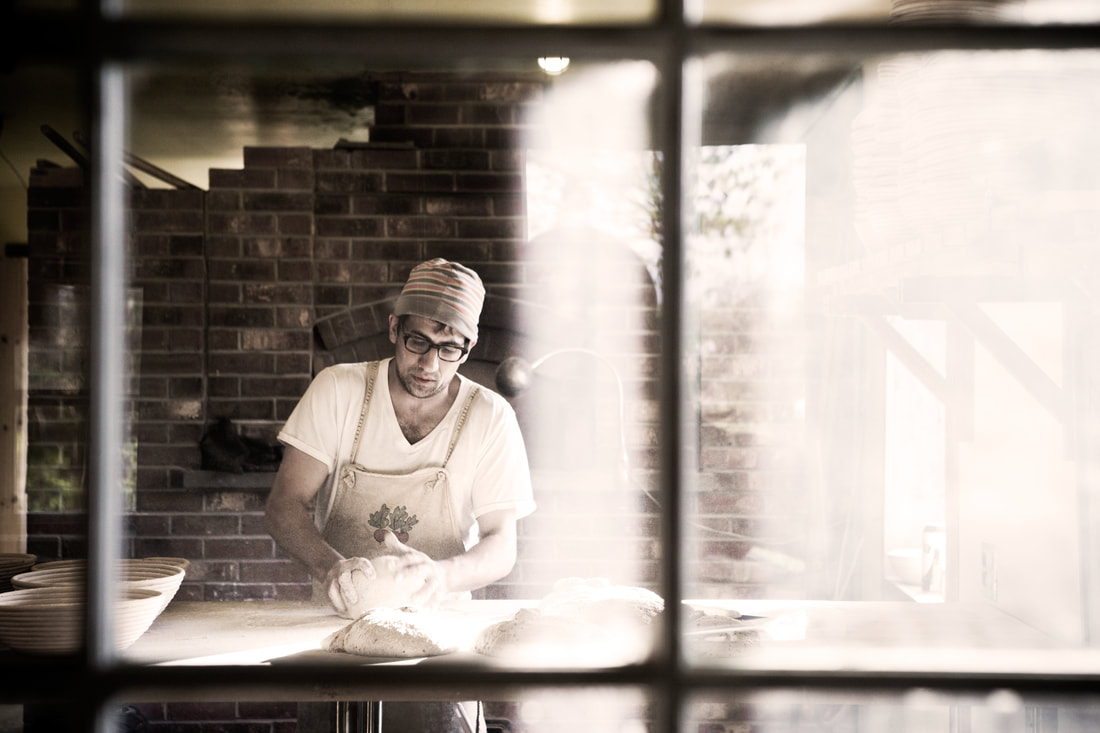|
BEGINNING
The bread that I make today isn't so very different from when I first opened ZU in 2000- naturally leavened and baked in a wood-fired oven; made from a mixture of freshly-milled whole grains, sifted flours, water and grey sea salt. Over time and with repetition has come an ability to more precisely observe the dough and the oven, but there is always variation in the results. This variation is what a word like artisinal really gets at. That is, bread made in limited quantities by hands in a somewhat primitive environment. Bread that is affected by the weather, the flour, the heat of the oven and the baking schedule. Artisinal bread should be rightly considered an ethic rather than an aesthetic. INSPIRATION When I first started the bakery, there was a single book I scoured endlessly from cover to cover: The Village Baker by Joe Ortiz. Ortiz’s book gave me something both tangible and etherial to dream of. With the craft of baking came tools and techniques, the physicality of work and a deep satisfaction in unloading loaves of bread from the oven. But there was something else that captured my attention in Ortiz’s description of the village bakeries that he so admired. He gave me a sense of the long lineage of bread bakers that I wanted to insert myself amongst. Each flour laden workshop he described was a variant of the same mechanism, arranged to provide bread to the villagers. With the help of a skilled mason, I built a modified Alan Scott wood-fired masonry oven. I began to imagine myself a village baker, albeit in a country with nutritional trends that consistently put bread under scrutiny and scorn. All along, I have resisted speculating on the health benefits that the breads I make may or may not possess and I have mostly avoided commenting on dietary preoccupations of gluten or carbohydrates. Instead, I have relied on the basic pleasure of eating real bread with butter, cheese, olives, fresh vegetables, cured meats, soups and wine to suffice as justification for its vital role in the village. It must also be true that the long lineage (now 14,000 years) of bread eaters has cemented an immutable collective dietary craving. BAKING For me, baking is a solitary act in which, much like long drives, my mind simultaneously stays attentive and drifts off. Baking nights are long and physical tasks carefully arranged so that there is always bread in the oven and doughs fermenting at staggered stages. In between there are short breaks for a bite of dinner or sip of beer. One of the unexpected pleasures of baking in a wood-fired oven is the utter silence of the machine. Music, podcasts and the occasional visitor are interspersed. SELLING By contrast, the farmers market is an entirely social event. Before market and while setting up for the day, vendors (my colleagues) catch up while exchanging quips and coffee. Then I am visited by customers (my companions), in which the transaction of bread for money is one made up of many exchanges. Some ask of my family and I of theirs, some mention politics, others describe meals or travels and then there are conversations about bread. This is meaningful commerce. BREAD RECIPES From the first time I tasted the breads of Lionel Poilâne and Jean Luc Poujauran on a trip to Paris years before I had the bakery, I wanted to emulate them and so I came to favor certain techniques. I prefer working with a stiffer levain (sourdough starter). Despite the many advantages of retarding or cold-fermenting the dough, I prefer to work with dough that remains at room temperature. My doughs are fairly high in hydration but not excessively so. My shaping is gentle and doesn’t involve the now very common technique of stitching. I bake the loaves dark but not to a point where there is bitterness to the crust. And still . . .there is always variation. |
